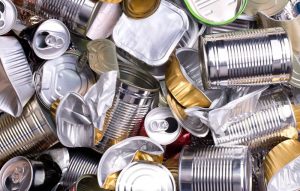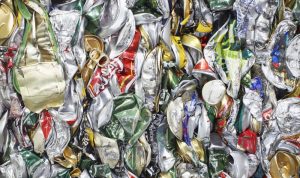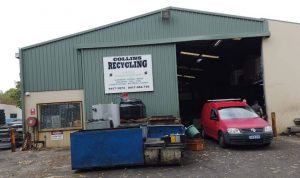Do you have a lot of soda cans in your kitchen, but you don’t know what to do with them? Before you decide to throw them into the bin, there is one thing that you should know: they can be recycled! Recycling tin cans can help reduce Australia’s generated household waste, estimated to be 13.8 million tonnes in 2016-17.
What Are Cans Made Of?
Cans were mainly epoxy-based, but they are slowly being replaced with better alternatives. These epoxy-based cans have been discovered to be toxic, despite being used in food and beverage cans.
Cans are generally made of three different materials:
- Tin-coated steel or tinplate
- Electrolytic chromium coated steel (ECCS)
- Aluminium
Most cans, regardless of the material used and produced, are coated inside and outside with films. These coatings are typically applied before forming the cans. Tin cans, however, do not have internal coatings if they are used for light-coloured juices, particularly acidic ones like peaches, pears, and pineapples. Tin is easily oxidised. Without the layer, it prevents the darkening of the fruits and flavour changes.
Food and beverage cans undergo a different sterilisation process. Food cans generally are put under pressure depending on the food type, while beverage cans are either pasteurised or sterilised.
So, Can You Recycle Cans?
Yes, you can recycle cans. They are even safe to dispose of straight into a rubbish bin if you hire one. Steel or tin cans, as well as aluminium cans, are often accepted. Steel is heavily recycled all over the world. In general, when people talk about steel cans, they mean tin cans. Technically, they’re not wrong because tin is made from steel, and the product is coated with tin.
It makes sense to know what you can and cannot recycle when dealing with cans. While it is true that you can recycle cans, certain types are not recyclable. Let’s start with the ones that can be recycled and reused, which are cans that contained:
- Soda or soft drink and bottle tops
- Food
- Jar lids
- Aerosol, hairspray, or insect spray
- Chocolates and biscuits
- Deodorant
- Pet food
Aside from the ones listed above, you can also recycle other metal items, such as aluminium foil and foil trays. Some toothpaste products have tubes made of aluminium. You can recycle them, as well.
Meanwhile, some of the metal items, which recycling centres do not accept are:
- Metal cutlery
- Kitchen pots and pans with metal
- Kettles
- Chip packets
- Candy wrappers
- Laminated foil from various products like cat food
- Metal containers of any product with chemicals, such as paints and engine oils
- Pipes
- Metal wires
You may be looking for soup cans in the lists above. You’re probably wondering why soup cans are not in both lists, even though they are fairly common all around the country. Currently, there is no clear regulation when it comes to recycling soup cans. These cans are made of steel or tin, which means you should be able to recycle them, right?
Unfortunately, the answer remains unclear – for now. However, there is a consensus to avoid reusing soup cans because they contain a tin coating. This coating is responsible for keeping soup fresh while preventing can corrosion. Soup cans are believed to have bisphenol-A or BPA, a type of plastic that affects fertility negatively.
If you now have a massive collection of soup tin cans, the best thing that you can do is to talk to your local council. Get recommendations on how you can recycle and reuse the cans. You can also search on Google where you can drop off these cans, but make sure you mention what type of cans you have. Some recycling facilities do not accept soup cans with BPA.
Pointers to Remember When Recycling Cans
Are you ready to recycle cans? Here are ways to ensure that you’re recycling them correctly:
- If you have food tins, make sure that you have removed the tin lids or at least placed them inside the can securely before collection.
- Biscuit lids are accepted, so you do not have to throw them away if you plan to recycle the tin can. All metal lids are recyclable, and you can place them inside.
- Aerosol cans typically have plastic caps, which you can also recycle. However, those caps should be separated from the cans. Don’t put them in the same bin as the aerosol can.
- Aluminium foil should always be crumpled tightly, forming a ball for a more secure disposal method. If you scrunched the foil and it goes back to its original shape, you have a laminated type of foil. That one is not accepted in recycling centres.
- As mentioned above, you can recycle toothpaste tubes and other items with aluminium inside. However, you should remove the plastic caps before putting the tube in the bin.
- Before collection, it is best to wash all the items first. If you have food containers, such as aluminium trays, you should remove all liquids and food to avoid contaminating the other recyclable materials. Leaving food debris in the recyclable items can affect the other tin cans in the bin and render them unrecyclable.
- While it is advised to clean the metal products before throwing them in the bin, you don’t need to remove the labels. The recycling facility can do this task for you.
All containers are required to be clean and empty. It may be an added chore for you, but it is necessary to ensure the safety of the equipment used in recycling. They should also be free from any hazardous chemicals. If you are unsure, always talk to the recycling facility before the collection. You do not have to put the products or containers in a plastic bag. Just keep them loose in the bin.
How Are Cans Recycled?
Humans have been dealing with cans since the 14th century. Canned packaging is considered one of the oldest forms of storing and sealing food. Steel cans lined with tin (often called bi-metal cans) can be recycled through the steps below:
- Many tin cans have labels. As mentioned earlier, you do not have to remove this paper label. The paper used is of low quality, so it can easily be removed during the recycling procedure. It’s certainly not worth your time detaching the label so you can recycle it.
- You should, however, rinse the cans to get rid of any leftover food or other residues. Cleaning the cans ensures that the bin will not smell horrible once the food begins to rot. Additionally, leaving the cans with food can attract animals and insects into your yard or even your home.
- If the lid is still attached to the can, you may want to remove it. The cover may also be made of steel. Once it is removed, you can place it inside the can and pinch the top to close it. Doing so prevents cats and birds from getting injured in those containers.
- After collection, steel cans will be separated from other materials, typically using a giant magnet.
- The cans will be crushed and lumped together, forming a ball.
- They will then be sent to a metal recycler before getting pressure-washed using a chemical. This specific chemical will remove the outer and inner layers of the tin can.
- Once washed, the can will be shredded into smaller pieces.
- The final step is to bring the metal into a furnace, where it will be melted to create flat sheets.
The recycling process is done. Steel can now be manufactured into items like beams, auto parts, appliances, and even new cans.
Why Is Steel Recycling Important?
Steel is one of the most utilised materials all over the world. Wouldn’t it be nice if you could reuse and convert it into a new product? According to Steel.org, steel has an over 88% recycling rate, making it the most recycled material on Earth. Of course, this large number is mainly due to scrap metal from cars. However, steel cans have always been known for their recycling efficiency since they can be recycled into any product made of steel.
Another reason why steel recycling should be enforced is its ability to be recycled infinitely. It’s even possible that the steel products you have right now came from another steel source. However, you will never know because this material does not lose its quality. Even when the steel has been recycled several times, it continues to have the same characteristics, especially with its sturdiness, composition, and appearance.
About 67% of new steel came from recycled steel, so about 33% of steel products still come from raw or virgin materials.
Compared to glass, plastic, and paper, steel and other metals are scarce. The limited supply should encourage everyone to recycle their tin cans.
What About Aluminium Cans?
It can be a little confusing whether you have an aluminium or steel can. These two, though, have distinct characteristics. Aluminium and steel are both made of metal. If you place a magnet close to these cans, it will go towards steel. The material is magnetic because it contains iron. So, if you see that the magnet sticks to a certain can, it is made of steel.
If you’re searching for aluminium cans, you will usually see this material in beer and soft drink packages. Steel, on the other hand, is mainly used for food packaging. However, some companies also decide to use either for their products.
If you have both materials, you should certainly have them recycled. However, if you want to recycle one that will give you more money, you can choose aluminium. This material typically costs more when you send your items to a recycling facility. While aluminium provides more cash when exchanged at a facility, steel cans have more benefits, especially considering the possible products they can be a part of. For instance, did you know that steel is also used in cars and buildings? Now, you do!
Can You Recycle Cans for Money?
The short answer is “yes.” Take your steel cans and other metals to Collin Recycling, and we will buy them from you. If you have a bulk of cans in your home, don’t just store them. Bring them to us or give us a call, and we can arrange a pick-up service for you.










